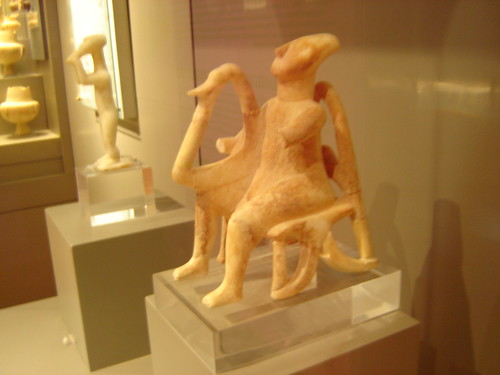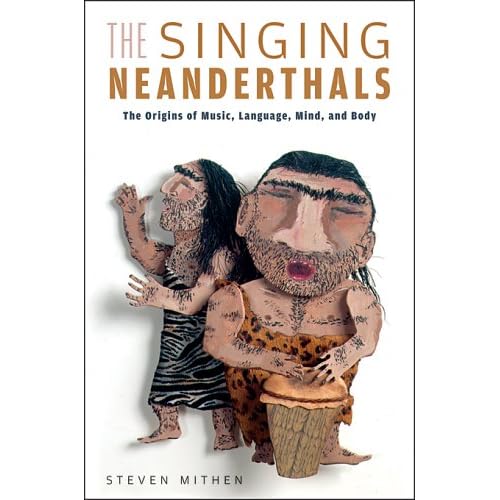WHAT HAPPENED WAS...See, most histories of Western classical music start with medieval church music, which most people know as Gregorian Chant.
Then I figured we should go back to the very beginnings of ancient Greece, Greek's "Dark Ages," to get a nice clean canvas on which to paint our understanding of music.
THEN I learned about Mycenaean Greece, a period preceding the Grecian dark ages in which Greece had a healthy but not amazing Bronze Age culture. Then I learned about the Dorian invasion, and the music they brought to Greece right before Greek's Dark Ages began (no it was not exclusively in the Dorian mode har har music nerd joke).
 |
| I swear I will finish this book some day |
So, here's a quick history ancient (kinda pre-) Greek music, from Mycenaean culture to the Greek Dark Ages (which Homer wrote about - more on that in the next update!)
Mycenaean Greece was a Bronze Age culture from 1900 to 1100 BC. Knowing who the Mycenaeans were means knowing who the Minoans were - the Minoans were an earlier, trade-focused culture that flourished on the island of Crete and then expanded outward to and across the Aegean Sea.
Trade worked well for the Minoans- and for music. Minoan art featured plenty of harpists and flute players.
 |
| Marble harpist (actually from somewhere between 2800 and 2300 BC. Wow!) |
But unfortunately the Minoan's neighbors, the Mycenaeans, found conquest to be more effective than trade. Around 1400 BC, the Mycenaeans, whose rulers were aristocratic warriors, invaded Crete (the Minoan capital), and continued their expansion, thus spreading their culture to ancient, ANCIENT Greece.
Doubt their ferociousness? Just look at these guys!
 |
| [caution - depictions of little awesome ancient army men may not be totally historically valid, and remember that no matter how hard you wish otherwise, The Indian in the Cupboard was just a book] |
 |
| Mycenaean vase, "Group of Three Dancers in a Ring", 1300 BC |
The Mycenaeans had a good 300 years, until 1100, when civilization in mainland Greece collapsed - launching Greece into their own dark ages, prompted by an invasion from .... nobody's sure. It's referred to as the "Dorian Invasion," but curiously, the actual word for "invasion" means something closer to "return home." A "return home" that, according to the archeological record, includes torching and destroying buildings they encountered along the way. Who the heck were these invaders? No one knows - one theory (of musicological interest) said they were Greeks who came from the Balkans:
And that brings us to the Greek Dark Ages - which we'll talk about 2 posts from now (and we'll have a composition challenge also!)
But what about the music?! Although one of my sources implied that music suffered under Mycenaean rule (presumably due to their emphasis on war and conflict?)[1]; most other scholars seem to think that the Mycenaeans had a musically active culture, even if we don't know much about it today. To the best of my (sketchy and hastily assembled) knowledge, what we know about their music is based on their artwork, some relics of instruments (cool!), and myths (like Orpheus (the lyre), Thamyras (singing), and Amphion).[2]
We know that there were professional palace musicians who performed religious hymns, royal praise poetry, and various other musical rituals.[1] And, of course we can assume that music was also part of a commoner's daily life- work songs, drinking songs, etc.
The instruments actually seem to have remained unchanged through much of Greek's heyday:
* Flutes
* Tridents that were somehow also musical instruments(?!)[1]
* The aulos - a double-barelled reed instrument[3]
* The phorminx - a lyre or psaltery
* The sistrum - a paddle-shaped tambourine
* The menat - an Egyptian instrument made of big beads on a string. It was used as a percussion instrument by shaking it (apparently in Egypt it was also worn as a necklace - maybe it did double duty?)
 |
| The Menat |
Some of these instruments would have been been dedicated to certain situations[3], like funerals, religious ceremonies, accompanying female singers, etc. In other cases, they probably would have been played together in an ensemble[3] in marketplaces, at fairs, etc.
One instrument that's really grabbing my imagination is the aulos - it was basically like playing two clarinets at once. You may wonder how to balance two clarinets at once - well, it's easy. Just STRAP THOSE SUCKERS TO YOUR FACE!
And although it may be tempting to think of these instruments and this music is primitive, the aulos actually sounds sort of like a lovely saxophone duet. Stefan Hagel at the Austrian Academy of Science has made some audio samples available - check it out and listen to the aulos samples (unfortunately I can't find a way to direct link, which is frustrating).
Ah yes, two saxophones played simultaneously by one person, allowing a remarkable degree of unity between two different tones. Such a lovely idea lost to antiquity, such a shame that...OH WAIT DID SOMEBODY SAY RAHSAAN ROLAND KIRK?!
(fun fact: I read that the idea of playing multiple saxophones at once came Kirk in a dream. Maybe in a past life he was an aulos virtuoso. I like that idea.)
And, lest we forget how awesome little army men are, the Mycenaean warband pictured above included an aulos player (here he is from a different angle):
And on that note, we'll bring this entry to a close - this is a lot more than I wanted to cover in one entry, and yet I still have a long list of resources I want to go back and draw from - I have no doubt I'm going to circle back and revise this entry later.
But, the point of this blog is COMPOSING music - so stay tuned; I'll be back tomorrow with a composition challenge to reconstruct/imagiconstruct some ancient Mycenaean music! (Hint: Get your reeded instruments ready. We're talking clarinets, harmonicas, melodica...).
Sources:
[1] Foundation of the Hellenic World
[2] John Curtis Franklin's article Music in Ancient Greece
[3] Myceneans: Life in Bronze Age Greece by Rodn Castleden











